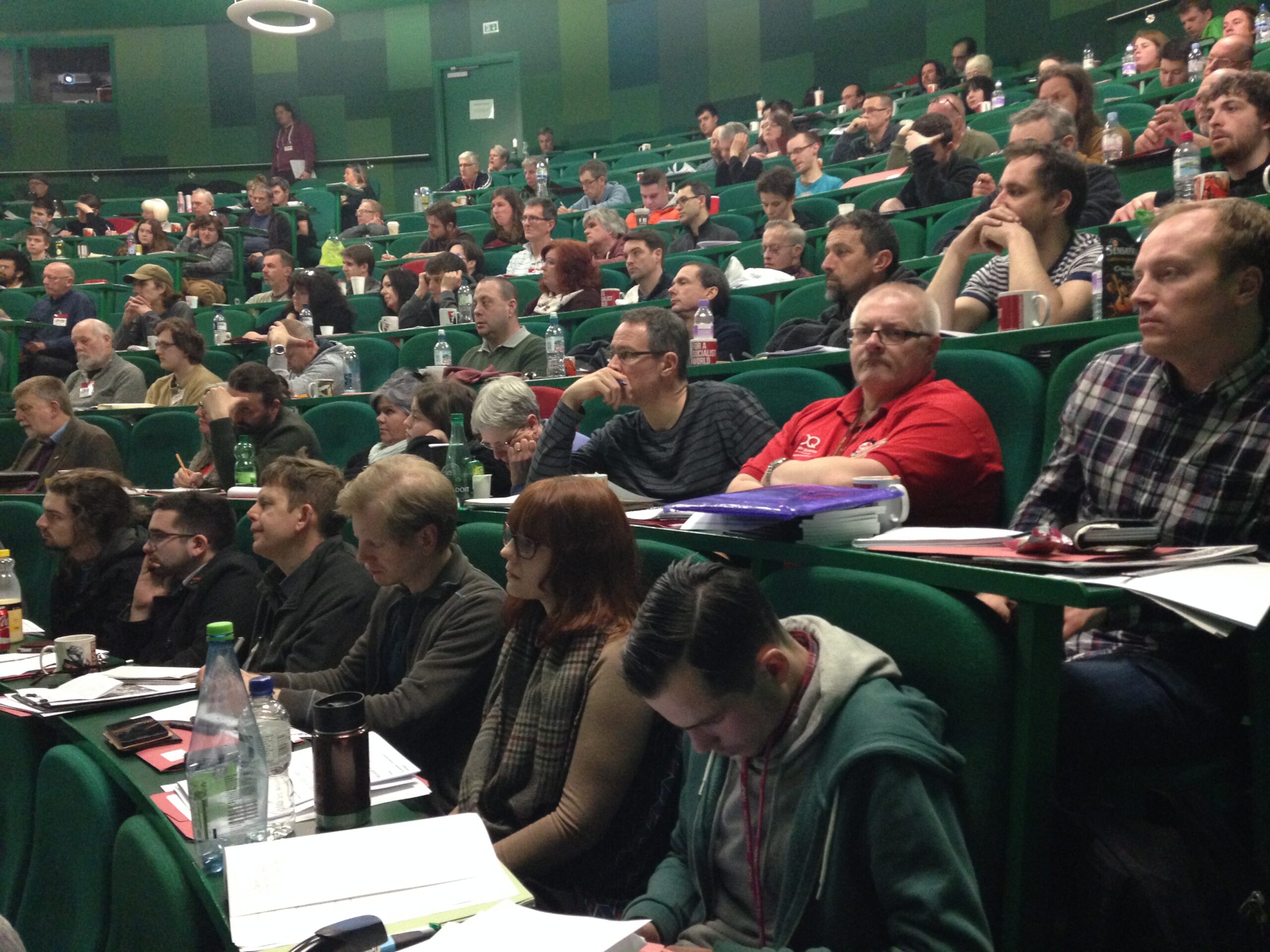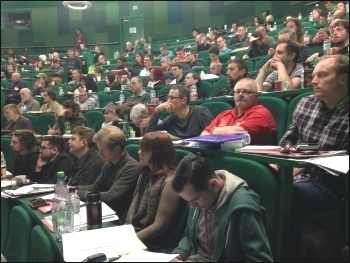A serious, thoughtful, optimistic and lively national congress of the Socialist Party took place from 19-21 March.
Delegates representing branches from Plymouth to Tyneside and Llanelli to Ipswich met in London to discuss the current stage of the struggle against austerity and capitalism and to make plans for the future.
See the articles below for reports from three of the discussions. Other sessions included: building the Socialist Party, finance, workplace and trade union work, a socialist approach to the EU referendum and a report from the work of the CWI (the international organisation the Socialist Party is affiliated to).
The fighting fund appeal raised over £10,000.
A world of crisis, ripe for revolution
Kevin Parslow
Peter Taaffe opened the Socialist Party’s 2016 congress with an introduction on the current world situation. On every major issue and on every continent, world capitalism is failing and this is recognised by their ‘experts’.
The world economy is still suffering severely from the crisis of 2007-08 and is now desperately attempting to avoid a new slump. Growth since then was fuelled by a massive worldwide injection of credit, including quantitative easing, and the Chinese economy.
With this slowing, two Chinese stock exchange crises have reflected the worries of capitalism. Peter said a world recession may not occur immediately, but mistakes like December’s interest rate rise in the US could bring this forward.
The world slowdown has slashed commodity prices and this will push millions further into poverty. There have already been massive repercussions in countries like South Africa and Brazil.
Socialist Party congress 2016, Peter Taaffe speaking, photo by Sarah Wrack (Click to enlarge: opens in new window)
Central banks have resorted to extraordinary measures including further quantitative easing and some have even introduced negative interest rates, charging depositors for holding their money.
Economists are even mooting ‘helicopter money’, directly giving people cash to spend. This may not work if deflation takes hold and workers delay purchases waiting for lower prices. Big corporations have huge bank deposits but won’t invest unless they can make huge returns.
Peter remarked that capitalism cannot solve the environment’s problems. The Paris summit was a failure and global temperatures are rising due to increased concentrations of greenhouse gases.
He then commented on the severe strains between the major imperialist powers, epitomised by Obama and Cameron’s spat over Libya and Syria and the paralysis in the Middle East. The colossal refugee crisis has blown the fallout from the civil war in Syria into Europe.
As the CWI predicted, a quick defeat of the Assad regime has not materialised. Russia may feel its intervention and withdrawal from Syria has re-established its immediate aims as a ‘great power’.
Putin may try to force Assad to make concessions without undermining the regime’s foundations, which can still rely on the support of Iran and 100 million Shias in the region.
As Isis/Daesh increasingly repels the population, it will also face revolts. When workers in the region begin to move against oppression, we will need to emphasise class unity against sectarianism.
As world inequality deepens, class tensions rise sharply. In virtually every country, the major pro-capitalist parties – including the former social democrats – are split.
Sanders
The world is ripe for revolution yet there are small numbers consciously fighting for a socialist world. Bernie Sanders’ call for ‘political revolution’ is remarkable. However, ‘socialism’ is a fresh idea in the US where there is little experience of Stalinism or social democracy.
A new crisis will pose the question of system change and socialism in the minds of the masses. The Socialist Party and the CWI explain to workers and youth what is really needed to change society.
Youth play a key role in all revolutions. In the recent uprising in Kasserine, Tunisia, they demanded: “We want jobs or another revolution!”
Peter commented that Europe is also entering a new phase of struggle. Greece faces new agonies. Further cuts are demanded while the EU wants to turn Greece into a giant campsite for refugees.
Spain and Ireland are politically deadlocked and both could face new general elections. A storm of protests from workers and students in France has erupted as the Hollande government attempts to attack working conditions and education.
In Germany, recent election gains for the far-right AfD put the future of Chancellor Merkel in doubt. Socialists will develop programmes against the far right throughout Europe.
Peter concluded by emphasising that our organisation is key to events because of our political unity and ideas. We have been tested but have emerged strong and confident as a lever to help transform the world.
The 21st century will be one of revolutions, even more than the 20th. It will differ in one crucial respect: learning from the experience of the past, we will fight for the victory of socialism.
Britain: political earthquakes ahead
Dave Carr
The bombshell resignation of Tory government minister Iain Duncan Smith formed the backcloth to the debate on Britain.
As deputy general secretary Hannah Sell reminded delegates in her opening remarks, just such a possibility of splits in the ruling party was outlined in the opening paragraph of the congress document.
The Tories are in a humiliating retreat over their plans to slash a further £4 billion, including from disability benefits. “Yes, IDS’s resignation reflects the Tory split over the EU but fundamentally they can feel the ground shaking under their feet, such is the unpopularity of Tory policies,” Hannah explained.
One consequence of this could be to give workers confidence to fightback and then the shaking ground could turn into an earthquake.
This isn’t the first retreat – the government has backpedalled over cutting tax credits. The weaknesses and divisions in the ruling class could be exploited by the organised working class if the trade union leaders were to coordinate industrial action against austerity.
Unfortunately, many trade union leaders are playing a baleful role and are holding back the struggle. This has resulted in setbacks. Since 2010 one million jobs have been lost in the public sector. Ironically it’s the junior doctors, less encumbered by this union bureaucracy, who are in the forefront of the struggle against government attacks.
But even without a lead from the union tops, local struggles are breaking out. This could escalate with the Tories’ school ‘academisation’ plan.
Social movements in Britain over issues like the lack of affordable housing, evictions and the housing bill. The battle to save the health service continues to erupt and we could see a renewed student movement over the higher education bill.
Young people in particular, who are at the sharp end of government austerity, could come to the fore in low pay and unionisation struggles.
As socialists, our starting point is what is necessary to take these struggles forward, taking into account people’s political confidence and consciousness.
Even before major industrial and social movements have developed, opinion polls indicate a favourable attitude among young people toward ‘socialism’. While what is meant by socialism is unclear, this is nonetheless indicative of a growing anti-capitalist mood in society.
Three months ago Osborne was trumpeting the ‘successes’ of Britain plc. Now he’s blaming the world economy for dragging the UK economy down, having discovered that it’s £18 billion smaller than he thought.
Government measures, such as quantitative easing, have simply led to renewed speculative price bubbles. There could be another financial crash leading to a new economic downturn.
The contradiction of modern times is that the underlying anger among the working and middle classes over the economic and social crises is not being expressed in a mass opposition party. Equally, the ruling class hasn’t got a reliable party to rule through, creating political instability.
No one predicted the landslide election of Jeremy Corbyn. His anti-austerity message, like Bernie Sanders’ in the US, struck a chord with many people new to politics as well as an older layer of left-leaning workers. Corbyn’s opponents could only serve up a diet of ‘austerity-lite’ policies.
Two parties
But his election hasn’t transformed Labour into a workers’ party. In fact Labour encompasses two parties – a capitalist party and a potential workers’ party.
But the structures of Labour remain in the grip of the Blairites. The new anti-austerity members are viewed with horror by the Blairites, who are waging a civil war against Corbyn.
We oppose Labour’s right wing and back Corbyn when he supports socialist policies – while criticising him when he backtracks, such as not instructing Labour MPs to opposing the bombing of Syria.
The EU, along with its anti-worker neoliberalism, is also anti-refugees. Its latest deal with Turkey reinforces the borders of ‘fortress Europe’. A vote against the EU would weaken British capitalism and undermine Cameron. Unfortunately, under right-wing pressure, Corbyn has u-turned over opposing the bosses’ EU in the forthcoming referendum. It means that both ‘remain’ and ‘leave’ campaigns are led by capitalist forces.
We have to fight for an independent, working class exit campaign based on socialist, internationalist opposition to the capitalist EU.
Delegates expanded points on Britain, including racism and the refugee crisis, the battle to save the NHS, trade union leadership, developments in the pro-Corbyn ‘Momentum’ campaign, Wales Assembly elections and Ukip, Labour and fighting austerity, local elections and TUSC, a report from Scotland, and more besides.
Click here to read the congress document, Perspectives for Britain
A separate session discussed the EU referendum in more detail.
A storm for youth – and favourable winds for socialists
Scott Jones
“There is no future for us, only a black void where our future should be” said Lily Douglas, a school student in east London, when she spoke in the youth and student session.
Lily described how she and her friends are organising weekly discussion groups, attending demos and leafleting against cuts after joining the Socialist Party over opposition to the bombing of Syria.
She described how at every opportunity, young people are facing attack. From attending a school threatened with academisation, to not being able to afford to go to university, to wanting to be a librarian at a time when libraries are being closed.
This sums up what Claire Laker-Mansfield, Socialist Party national youth organiser, described as a “perfect storm” engulfing youth around the world, when she opened the discussion.
Socialism popular
But it is a storm with favourable winds for socialists. Claire mentioned recent polls which show that under-24s in Britain have a minus 15 favourability rating of capitalism, and there is growing interest and support for socialist ideas.
Young Socialist Party and Socialist Students members are at the forefront of this growing movement. Socialist Students has marked itself out as the main organisation of struggle on campuses.
Maddy Steeds reported that in Leeds, Socialist Students has forced the student union to set up a student run, not-for-profit letting agency and built links between trade unions and students.
There were further excellent reports from Swansea, Portsmouth, Leicester, Birmingham, Nottingham and Hatfield. Our young members are also playing leading roles in other campaigns like the struggle to defend Huddersfield A&E, as reported by Aaron Bailey.
Jac Green explained why she joined the Socialist Party, saying that all of her childhood friends have been forced to leave her hometown of Corby in Northamptonshire to find work.
In finishing the discussion Sarah Wrack, editor of the Socialist, summed up the complete insecurity young people are facing as their hopes and aspirations are being let down on an unprecedented scale.
But also how marvellously our young members are fighting back and stepping up to be the next generation of socialists – a generation that can change the world.











